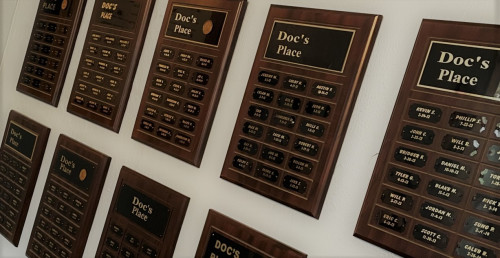

Doc's Place Recovery
Treatment Focus
This center primarily treats substance use disorders, helping you stabilize, create relapse-prevention plans, and connect to compassionate support.
Primary Level of Care
Transitional housing designed to support individuals recovering from substance use disorders offering a safe, supportive and structured environment for practicing long-term sobriety, while reintegrating back into daily living.
Claimed
Recovery.com has connected directly with this treatment provider to validate the information in their profile.
Treatment Focus
This center primarily treats substance use disorders, helping you stabilize, create relapse-prevention plans, and connect to compassionate support.
Primary Level of Care
Transitional housing designed to support individuals recovering from substance use disorders offering a safe, supportive and structured environment for practicing long-term sobriety, while reintegrating back into daily living.
Private Pay
You pay directly for treatment out of pocket. This approach can offer enhanced privacy and flexibility, without involving insurance. Exact costs vary based on program and length of stay. Contact the center for specific details.
Doc's Place Recovery
Doc's Place Recovery
About Doc's Place Recovery
Situated on the shoreline of southeast Georgia, Doc's Place Recovery provides long-term sober living for men, especially guys in their 20s and 30s, recovering from drug or alcohol addiction. Alumni house managers and speakers contribute to house life and off-site excursions.
The entry fee of $4,500 includes groceries for the first month.
Doc's Place currently has 3 locations near each other.
Routines
The days begin by 9 a.m. on weekdays and by 10 a.m. on weekends. During the day, clients participate in a 12-Step Facilitation meeting, such as an Alcoholics Anonymous (AA) meeting. By day 14, Doc's Place expects residents to work at a full-time job. The standard curfew time is 11 p.m.
On the weekends, Doc's Place leverages their proximity to the beach and parks to facilitate group activities like surfing, fishing, sports, fitness training, and more community events. They also keep surfboards onsite for clients to check out. Clients can request weekend passes after 90 days of living at Doc's Place.
Doc's Place brings in group therapists, and alumni and guest speakers sometimes visit to speak to clients. The therapists and speakers address co-occurring mental health issues that can affect sobriety.
Every other week, staff review clients' recovery progress.
The program lasts a year, and many clients stay longer.
House Rules
To ensure continued sobriety, Doc's Place performs weekly random drug tests, which the house provides at no charge. They allow residents to use electronic devices after 30 days by approval of a house manager or a director. Clients can use their phones to communicate with family, their workplace, Doc's Place staff, and other parties involved in their recovery.
Directors or staff members approve visitors or medications. They don't allow products containing alcohol, such as mouthwashes and cough medicines, or non-alcoholic beer.

Center Overview
Treatment Focus
This center primarily treats substance use disorders, helping you stabilize, create relapse-prevention plans, and connect to compassionate support.
Pricing and Program Length
Estimated Center Costs
The cost listed here ($4,500 for admission, $115-$175 for weekly rent), is an estimate of program cost. Center price can vary based on program and length of stay. Contact the center for more information. Recovery.com strives for price transparency so you can make an informed decision.
Levels of Care





Your Care Options
Specializations
Experiential
Expressive tools and therapies help patients process past situations, learn more about themselves, and find healing through action.
Who We Treat
Young Adults
Emerging adults ages 18-25 receive treatment catered to the unique challenges of early adulthood, like college, risky behaviors, and vocational struggles.
Approaches
Spiritual Emphasis
Spirituality connects patients to a higher power and helps strengthen their recovery, hope, and compliance with other treatment modalities.
Experiential
Expressive tools and therapies help patients process past situations, learn more about themselves, and find healing through action.
Family Involvement
Providers involve family in the treatment of their loved one through family therapy, visits, or both–because addiction is a family disease.
Individual Treatment
Individual care meets the needs of each patient, using personalized treatment to provide them the most relevant care and greatest chance of success.
Twelve Step
Incorporating spirituality, community, and responsibility, 12-Step philosophies prioritize the guidance of a Higher Power and a continuation of 12-Step practices.
Therapies
1-on-1 Counseling
Patient and therapist meet 1-on-1 to work through difficult emotions and behavioral challenges in a personal, private setting.
Experiential Therapy
With this approach, patients heal by doing. Therapists help patients process difficult emotions to speak, using guided activities like art or dance.
Family Therapy
Family therapy addresses group dynamics within a family system, with a focus on improving communication and interrupting unhealthy relationship patterns.
Twelve Step Facilitation
12-Step groups offer a framework for addiction recovery. Members commit to a higher power, recognize their issues, and support each other in the healing process.
Substances We Treat
Alcohol
Using alcohol as a coping mechanism, or drinking excessively throughout the week, signals an alcohol use disorder.
Drug Addiction
Drug addiction is the excessive and repetitive use of substances, despite harmful consequences to a person's life, health, and relationships.
Languages
Aftercare
Care Designed for Your Needs
Personal Amenities
Special Considerations
Gender-specific groups
Patients in gender-specific groups gain the opportunity to discuss challenges unique to their gender in a comfortable, safe setting conducive to healing.





